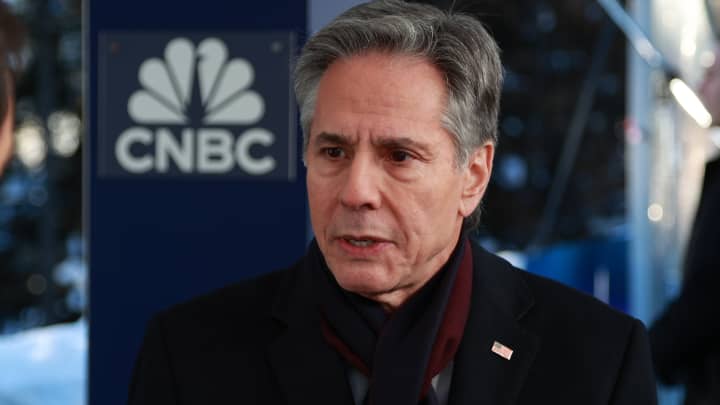
Secretary of State said Tuesday that China's growing aggression toward has undermined the country's own interests.
"I think the approach that they've shown in recent years has actually been totally counterproductive to their interests," Blinken said at the World Economic Forum in , Switzerland on CNBC's "Squawk on the Street."
Taiwan is an epicenter for the production of semiconductors, which China , and the adjacent Taiwan Strait is a major commercial route that has implications for economic stability in the region.
Blinken's comments come days after Taiwan voters elected the Democratic Progressive Party's Lai Ching-te to serve as the next president. Of the candidates, Lai was 's least favorite as he would likely maintain the DPP's status quo when it comes to relations with mainland China and the U.S.
In the weeks leading up to the election, Taiwan officials reported several by the Chinese government to sway the election via escalating military pressure and disinformation campaigns.
Despite China's distaste for Lai, the White House has been supportive, issuing several for the president-elect. That has further angered Beijing.
"The US State Department's statement on the election in China's Taiwan region seriously violates the one-China principle and the three China-US joint communiqués, and goes against the US' own political commitment to maintaining only cultural, commercial, and other unofficial relations with the people of Taiwan," China's Foreign Ministry wrote in a Sunday.
"It also sends a gravely wrong signal to the 'Taiwan independence' separatist forces. We strongly deplore and firmly oppose this, and have made serious representations to the US side," the statement said.
At Davos, Blinken reiterated the official U.S. stance on Taiwan and China, which simultaneously supports Taiwan's democratic systems but does not support its independence.
The outcome of Taiwan's election would inevitably have ripple effects on the geopolitical climate and economic landscape. The U.S. has been preparing accordingly.
Days before Taiwan voters took to the polls, the White House said it was preparing various contingency plans for a possible "period of higher tension."
"I don't want to get into specifics on those, but of course, we have to be prepared and thinking through any eventuality ... ranging from no response to the higher end," a senior administration official said Wednesday.
China, which claims sovereignty over Taiwan, has made clear its intentions to reunify the island with the mainland, including during President Joe Biden's one-on-one meeting with Chinese President Xi Jinping. China has not ruled out military force to execute that goal.
"What we're focused on is maintaining peace and stability and we've been very clear with China about that and we've been very clear with Taiwan about that," Blinken said.


